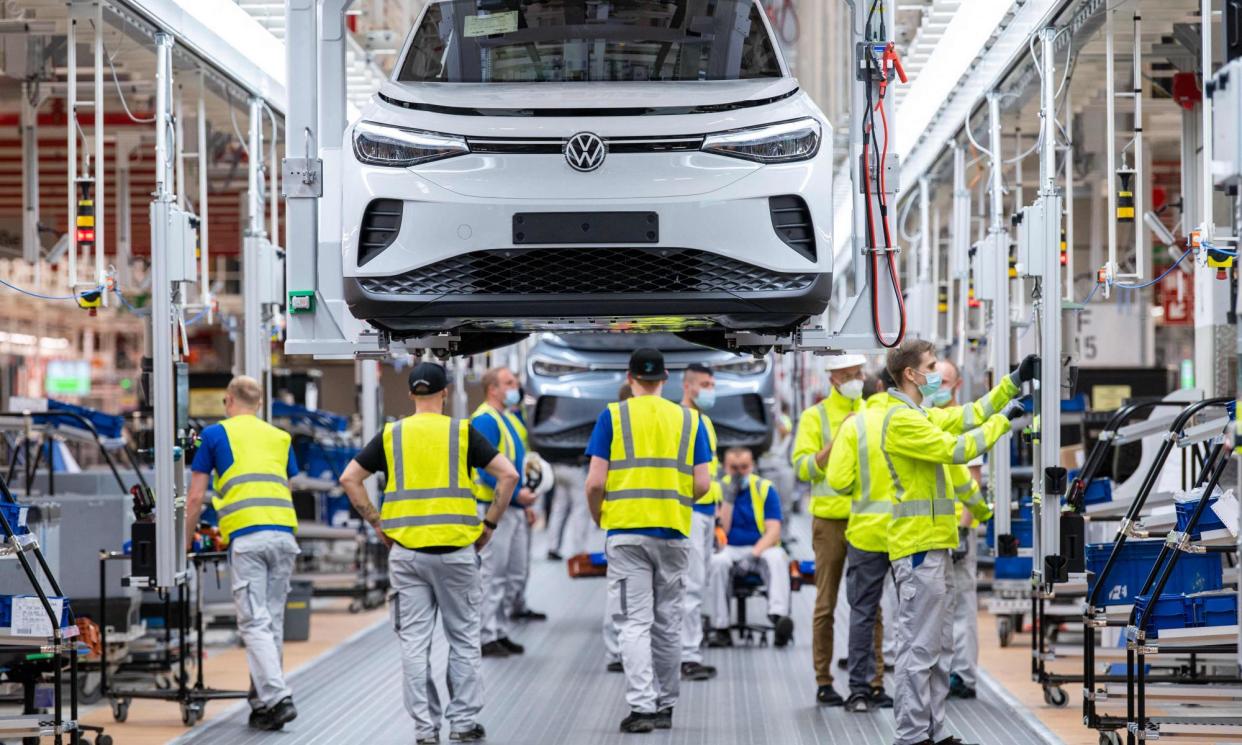VW slams production into reverse as industry faces battles on all sides

When Bernd Pischetsrieder attempted to cut jobs at Volkswagen in the early 2000s, he was forced out. When Herbert Diess tried the same, he got the same result, leaving in 2022. Yet now Volkswagen appears to be deliberately grasping the nettle.
“This time it’s different,” says Matthias Schmidt, a Berlin-based automotive analyst. Chief executive Oliver Blume is “VW through and through”, and his actions likely reflect the desires of the controlling Porsche and Piëch dynasties, Schmidt said. The course is set for a historic clash over the future for Germany’s largest carmaker.
The manufacturer’s announcement this week that it is considering the closure of two German factories has shocked its workforce, who gave a first taste of the opposition they will mount with protest banners carried into a meeting of thousands of employees with executives on Wednesday.
It comes as Europe’s incumbent carmakers find themselves squeezed on all sides. Demand across the car market is subdued, EU and UK rules on average carbon emissions are tightening, and Chinese competitors are muscling in on their business.
That may be why VW’s owners have decided that now is the time to cut factories. Schmidt says that the company has long been a “bloated monster” in its home operations.
The group has the capacity to produce 2.7m cars a year in Germany, according to figures collated by Marklines, a data company. However, its factories collectively only produced just under 2m cars in 2023, suggesting that several are indeed being severely underused.
Osnabrück, in Lower Saxony, and Dresden, in Saxony, have previously been earmarked by analysts as potential targets for closure. Osnabrück – nominally capable of 100,000 cars a year, but running far below that in recent years, according to Marklines – produces the T-Roc Cabriolet, and the Golf, which is on its way out. Dresden has a smaller capacity of 20,000, but its 2023 output of 6,000 also suggests it is running inefficiently.
Andrew Bergbaum, global co-leader of the automotive practice at AlixPartners, a consultancy, said that “Europe does have overcapacity” in the car industry overall, although he added that some of the resultant restructuring may take the form of factories shifting to produce electric parts.
Factory closure decisions are always politically fraught, but VW will have to pay closer attention than most. The state of Lower Saxony is Volkswagen’s second-largest shareholder, with 20% of voting rights. Stephan Weil, the state’s premier, said on Monday that plant closures should “simply not come into question”.
Germany’s chancellor, Olaf Scholz, will also be watching closely. Thousands of job losses could fuel economic resentments that have contributed to the revival of the German far right; Alternative für Deutschland on Sunday became the first far-right party since the Nazi era to win a state election.
It is as yet unclear how Volkswagen’s factory closures will affect the shift from petrol to electric. Blume’s predecessor, Diess, had set a course for Volkswagen to catch up with rivals in zero-emissions vehicles, amid the backlash from the Dieselgate scandal – in which it had been found to have cheated emissions tests – and soaring demand for electric cars during the pandemic.
Dieselgate was back in the headlines this week at the start of the trial of former VW chief executive Martin Winterkorn, but things look different now for the electric car market, with some carmakers rowing back on previous ambitions as sales stagnate. Volvo on Wednesday added to the sense of a European industry retrenching, as it ditched a target to sell only electric cars by 2030.
Volvo, Ford and Mercedes-Benz are among the carmakers who plan to make more of their profitable hybrid cars (combining a smaller battery with a fossil fuel engine) rather than going all-out for the climate lead.
Yet even if they wanted to, Europe’s carmakers cannot ignore the need to reduce emissions from their cars – a vital step in meeting the Paris climate goal of keeping global heating within 1.5C of preindustrial levels. Carmakers must meet stricter targets in 2025 under EU law, or face steep €95 (£80) fines for every extra gram of CO2 each car produces on average.
Philippe Houchois, an analyst at Jefferies, says that Volkswagen is “worst positioned for 2025 compliance” out of the main European carmakers. It needs to reduce average emissions from the cars it sells in 2025 by 23% compared with 2023 levelsto avoid fines.
“2025 CO2 targets could accelerate capacity restructuring across the industry,” says Houchois.
His analysis suggested Ford and Stellantis, the owner of brands including Fiat, Peugeot and Vauxhall, may also need to cut capacity.
But increasingly competitive rivals from China are perhaps the greatest shadow over European factories, and may have influenced Volkswagen.
Rico Luman, an economist at ING, an investment bank, says carmakers are trying to hang on to “much more profitable” hybrid cars, but they need to keep investing in electric technology. Volkswagen’s global market share has fallen as electric sales have increased.
“I am a bit wary of losing market share,” says Luman. “You should focus on the long term. You can tweak a bit with production delays, but you can’t postpone it for five or 10 years.”


